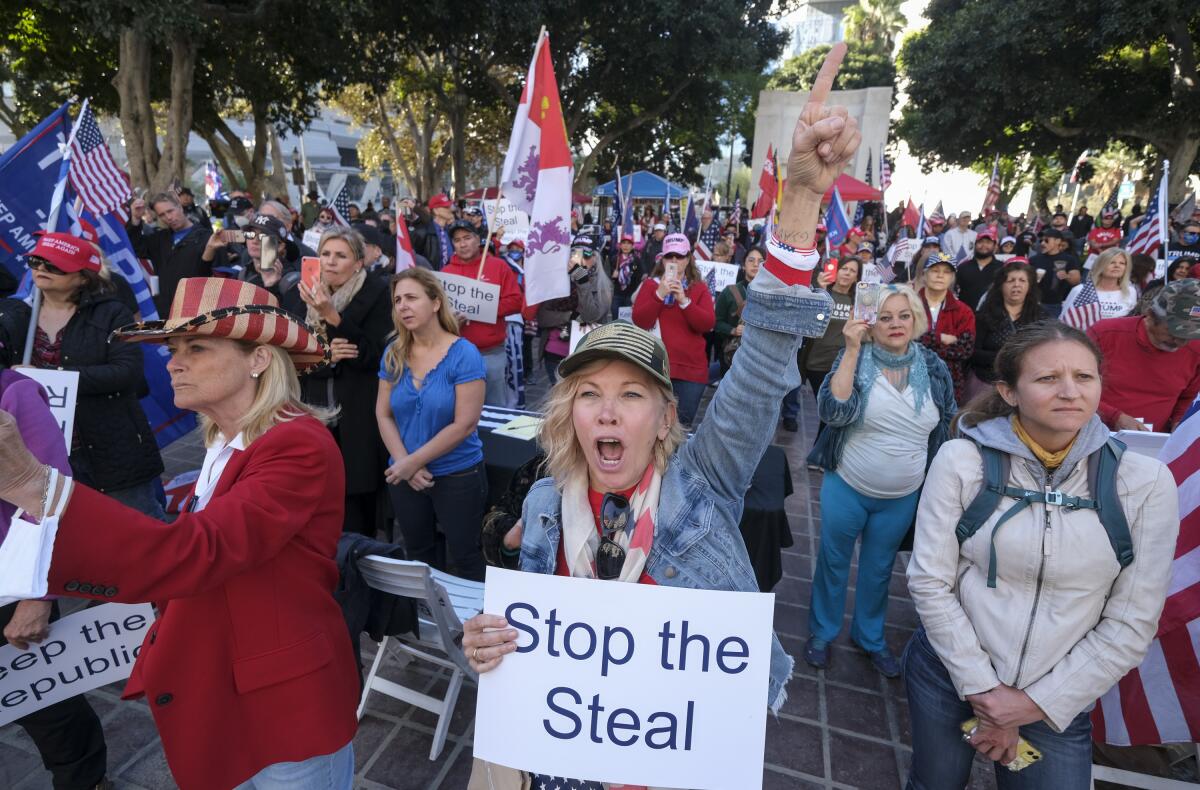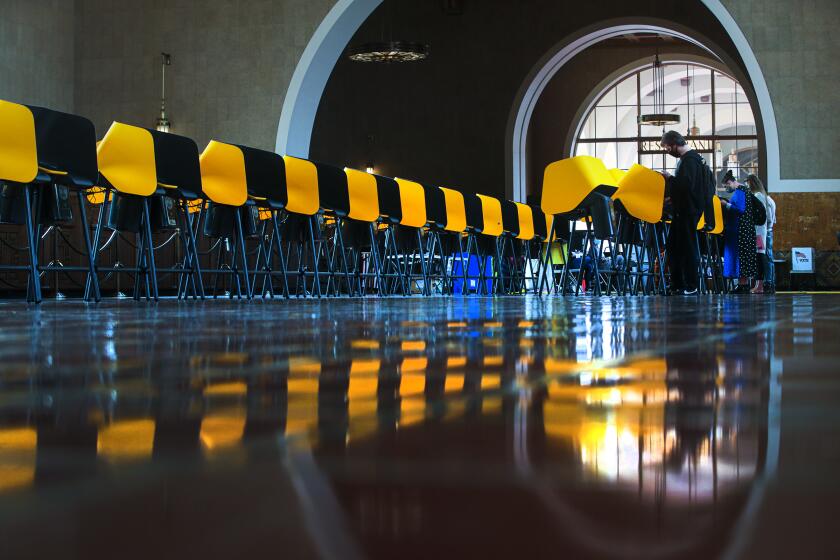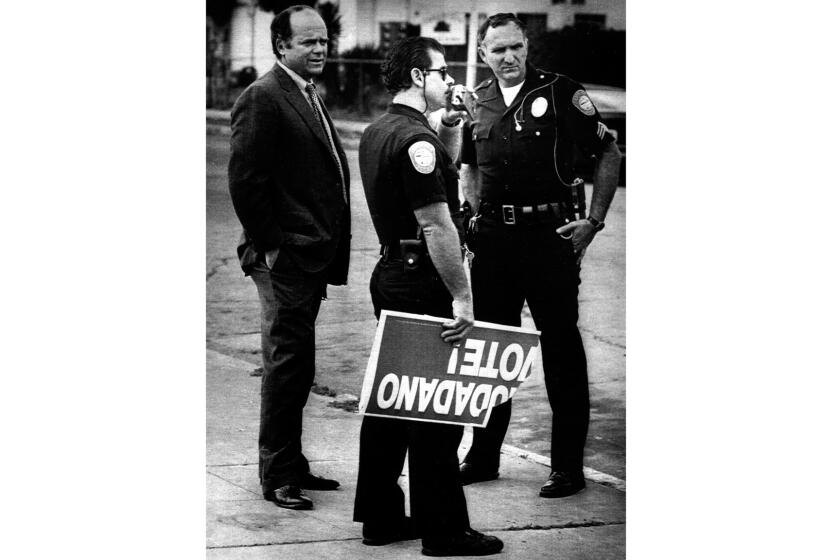Vigilantes claimed voter fraud. A thousand false leads later, investigators found one case

It took the Riverside County district attorney’s office a year of legwork that included more than a thousand false leads to find a prosecutable case of voter fraud: A young man who twice cast two ballots in 2016 elections.
The extraordinary effort that resulted in just a single prosecution highlights the challenge authorities face when dealing with allegations of massive voter fraud.
The Riverside County investigation examined allegations made by an unnamed “election watchdog” group that claimed to identify more than 1,000 deceased people on voter rolls, 7,500 voters registered more than once, and 317 people who cast more than one ballot in elections.
Right off the bat, investigator Levi Bailey said, all of the dead voters they checked proved to be alive.
After laborious work grappling with large, error-filled databases and at times requiring the help of the entire investigations bureau, investigators told The Times they identified more than 70 cases of double voting. Almost every one of those double votes was determined to be accidental.
“Many of [the voters] were older and were confused,” said special prosecutions Chief Deputy Kelli Catlett. “And so they had received multiple ballots and then submitted multiple ballots thinking, ‘Oh,... something must have happened to my first one.’
“It was clear, there was no intent to defraud.”
Catlett and her colleagues in the unit, however, determined that one young man’s double voting in 2016 was intentional.
He was 18 when a signature gatherer outside a WalMart signed him up to vote the first time and he gave false information. “I asked why he gave an incorrect birthday,” an investigator wrote in his request for an arrest warrant. “He stated he probably did not trust the guy.” Two years later, he registered again, this time with the right birthday. The double registrations resulted in two ballots arriving in the mail for the 2016 primary and general elections. According to the arrest warrant, he filled out both each time.
Conservative activists pressure election officials to drop people from voting rolls, claiming it invites massive ballot fraud in California
The man agreed to plead guilty, but investigators said he gave no explanation for voting more than permitted. He was sentenced to a day in jail and 250 hours of community service.
Joseph DelGiudice, chief of investigators for the district attorney’s office, said it was important to investigate allegations of election fraud, even if they lead to few prosecutions.
“There’s a general distrust for the accuracy of elections right now,” DelGiudice said. “So if, for no other reason, even if there is no smoking gun at the end of this, it needs to be looked into, so the fear of the public is allayed, and we reinstitute a level of security and confidence in our elections.”
The public integrity unit has investigated other elections cases initiated off tips, including from a local Republican club. Those include allegations of forged and fraudulent registrations as well as the prosecution of a noncitizen who allegedly voted in three elections. Agents have found noncitizens accidentally registered to vote by the state DMV’s automatic system, and cases where voters were assigned multiple registration numbers, resulting in extra ballots mailed to their homes.
But, DelGiudice said, the unit has found no evidence of widespread fraud.
A retired Riverside County judge, who previously worked as a prosecutor in the district attorney’s office, questioned the use of resources to pursue thinly supported claims made by voter watchdog groups.
“Absent some sort of evidentiary basis to conduct an investigation, to put a bunch of effort into it when the people who are certifying elections are doing their own investigations .... why does the DA feel they have to get involved in it?” said Rick Thierbach, who retired from the bench in 2015. “Unless, it’s a political move.”
The Riverside County district attorney’s office stands out in California for its willingness to investigate match lists produced by election fraud watch groups.
The activists’ lists are notoriously flawed.
Democratic lawmakers in Congress have tried since at least 2007 to pass legislation to prohibit election officials from removing voters based on lists made by matching names on computer databases without verifying personal information, such as signatures, photographs or Social Security numbers. The provision is part of a package of voting measures backed by Democrats and blocked by Republicans in the Senate earlier this week.
The myth of undocumented immigrants traveling from poll to poll to illegally vote goes back more than three decades in California and has spread nationwide.
At a 2016 hearing of the U.S. Election Assistance Commission, which makes voting rights reports to Congress, one of California’s most prominent voter fraud activist groups, the Institute for Fair Elections, provided lists naming voters in Los Angeles and Sacramento counties who it alleged had illegally voted more than once in the same election.
The Times found many of those voters lived in large apartment complexes and shared common names — such as Jung Kim as well as Young Kim and Maria Garcia — with others in the same buildings who voted in the same elections. To make the allegation of double- and triple-voting, the Institute had to ignore numerous distinguishing characteristics that showed these were different voters, including apartment numbers, phone numbers, email addresses, genders, middle names, countries of birth, languages, ages and political parties.
The Times found repeated instances where ballot security organizations pushed claims of potential fraud in the face of contradicting evidence.
The state Department of Justice in 2020 chided the Election Integrity Project for claiming to discover dead people on voting rolls when it had pulled those names from a database that contained cancelled registrations, including entries where authorities had already identified the voter as deceased.
The Institute for Fair Elections on its website currently lists “absurd” voter locations, a tactic frequently used by others to undermine confidence in California’s electoral system, including by a Republican candidate for Secretary of State. Among the institute’s suspect registrations: 71 voters it claims are registered at a Malibu coffee shop.
But the coffee shop is in a large shopping plaza on Pacific Coast Highway that also houses a Postal Annex, where customers rent mailboxes. The registration database contained strong evidence against any conclusion these were coffee shop constituents: The majority of those registrations included postal box numbers.
More to Read
Sign up for Essential California
The most important California stories and recommendations in your inbox every morning.
You may occasionally receive promotional content from the Los Angeles Times.













